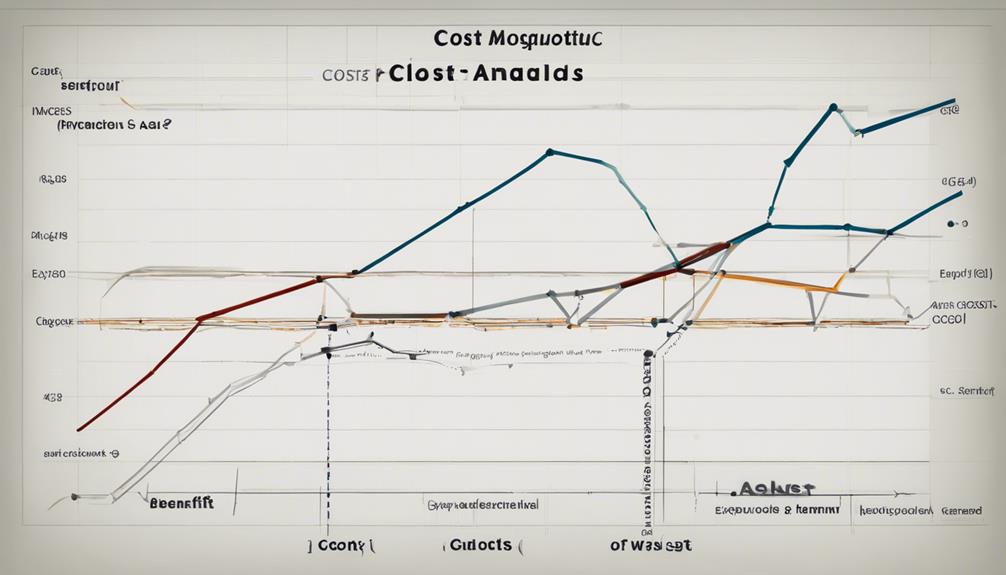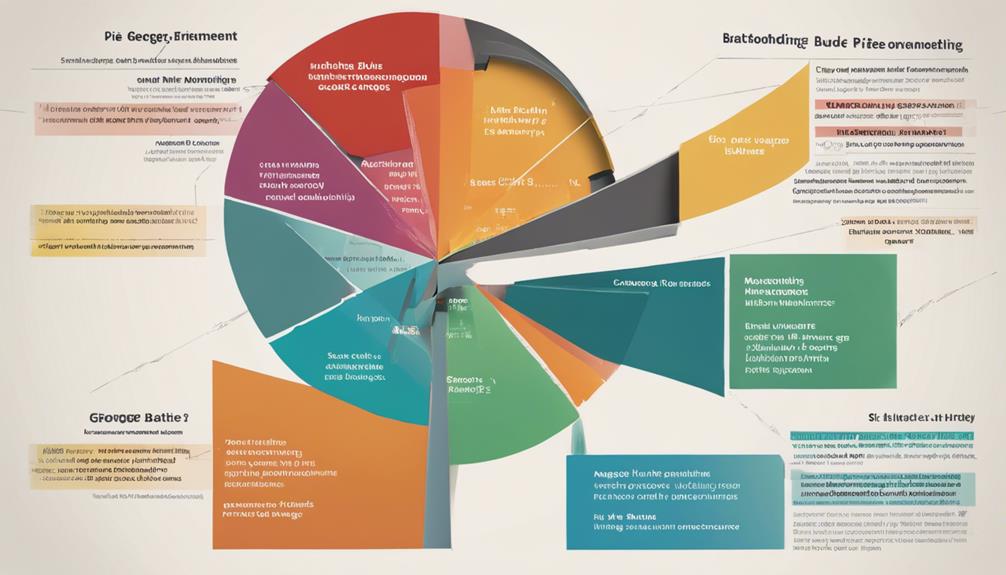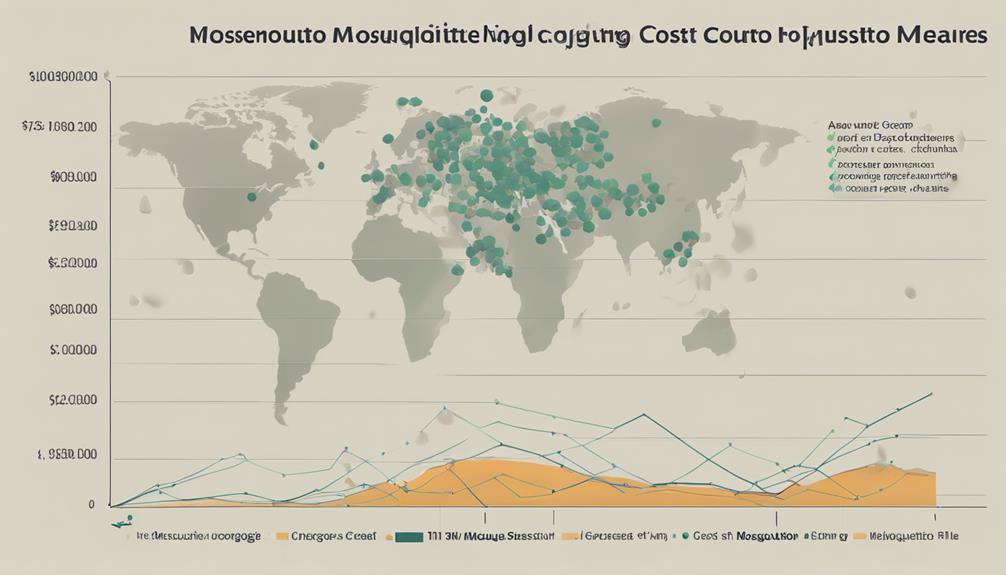Investing in mosquito control in St. George offers cost savings and health benefits. It reduces productivity losses from diseases, ensuring positive returns on investment. Billions are spent yearly in the U.S. on healthcare and lost productivity due to mosquitoes. Diseases harm industries like tourism and agriculture. Strategic public health funding is key for disease mitigation. Proactive measures safeguard residents’ health and enhance quality of life. Efficient investments lead to reduced healthcare costs and better health outcomes. Discover the economic impact and value of mosquito control programs in St. George.
Key Takeaways
- Mosquito control investments lead to cost savings and health benefits.
- Diverse funding sources are crucial for sustained control efforts.
- Southwest Mosquito Abatement District prioritizes targeted methods.
- Collaborative efforts enhance resource allocation and effectiveness.
- Mosquito control programs reduce healthcare expenses and disease transmission risks.
Cost-Benefit Analysis of Mosquito Control

Investing in mosquito control measures in St. St. George yields significant cost savings and health benefits, making it an essential component of public health policy and economic strategy. The cost-benefit analysis of mosquito control in St. George reveals a compelling case for proactive measures. By investing in efficient mosquito control programs, the community not only saves on healthcare costs but also enhances the overall quality of life for its residents. Economic analysis demonstrates that the returns on investment from mosquito control efforts result in a positive impact on public health and the well-being of the population.
Moreover, the economic benefits extend beyond healthcare savings to include a reduction in productivity losses associated with mosquito-borne diseases. By minimizing the prevalence of these diseases through targeted control strategies, St. George can foster a more productive workforce and a healthier community. Decision-makers can leverage this data-driven approach to optimize resource allocation, ensuring that investments in mosquito control yield maximum benefits for public health and economic outcomes.
Economic Impact of Mosquito-Borne Diseases
Annually, billions of dollars are expended in the U.S. on healthcare costs and lost productivity due to mosquito-borne diseases, impacting various sectors such as tourism, outdoor activities, agriculture, and construction. The economic repercussions of mosquito-borne illnesses like West Nile virus and Zika virus extend beyond just healthcare expenses; they disrupt the normal functioning of industries and activities that rely on outdoor spaces.
The burden of these diseases not only affects individuals’ health but also strains public health budgets, diverting resources from other essential programs. Additionally, productivity losses in key sectors such as agriculture and construction due to employees falling ill with mosquito-borne illnesses are significant.
Addressing the economic impact of mosquito-borne diseases through investments in effective control measures is essential. Preventing outbreaks through mosquito control can lead to substantial cost savings in healthcare expenses and productivity losses, making it a sound investment in both public health and economic stability. Prioritizing mosquito control isn’t just about health; it’s a strategic economic decision with long-term benefits.
Budget Allocation for Mosquito Abatement

When considering budget allocation for mosquito abatement in St. George, it’s vital to analyze the funding sources available to sustain control efforts.
Evaluating the cost-effectiveness of various control methods is essential to guarantee efficient resource utilization.
The impact of budget decisions on public health outcomes underscores the significance of strategic allocation in combating mosquito-borne diseases.
Funding Sources for Abatement
For effective mosquito abatement in St. George, securing diverse funding sources is essential to sustain control measures and safeguard public health. The Southwest Mosquito Abatement & Control District allocates a specific budget for mosquito abatement activities, with funding coming from local taxes, grants, and partnerships. This budget allocation is vital for implementing effective control measures, as it varies annually based on needs and priorities.
Reliable funding sources for abatement in St. George are critical for sustaining mosquito control efforts and protecting public health. By ensuring adequate financial support for the Control District, St. George can effectively combat mosquito-borne diseases and create a healthier environment for its residents.
Cost-Effective Control Methods
To optimize the cost-effectiveness of mosquito abatement efforts in St. George, the Southwest Mosquito Abatement & Control District strategically allocates its budget to prioritize targeted control methods such as pesticide applications and elimination of breeding sources.
By focusing on these pest control strategies, the district aims to not only reduce mosquito populations but also mitigate potential public health risks associated with mosquito-borne diseases. Effective pest control measures not only contribute to the well-being of the community but also demonstrate a proactive approach towards safeguarding public health.
Through the allocation of resources towards these targeted control methods, the district guarantees that its budget is utilized efficiently to combat mosquitoes, thereby maximizing the impact of mosquito abatement efforts on the overall public health of St. George.
Impact on Public Health
Strategic allocation of public health funds towards mosquito abatement programs in St. George is essential for mitigating disease transmission risks and enhancing community well-being. Investing in mosquito control not only reduces the prevalence of mosquito-borne diseases but also contributes to overall public health outcomes.
Proper budget allocation for mosquito abatement guarantees a proactive approach to preventing outbreaks and protecting the well-being of St. George residents. By prioritizing mosquito control measures, the community can greatly reduce the burden of illnesses associated with these vectors.
Effective public health funding for mosquito control programs is a vital policy decision to safeguard the health and safety of the population, underscoring the importance of prioritizing resources for this preventive measure.
Return on Investment in Mosquito Control

Investing in mosquito control in St. George proves cost-effective by reducing healthcare expenditures and preventing diseases spread by mosquitoes.
The impact on public health is substantial as fewer cases of mosquito-borne illnesses lead to improved well-being and productivity.
Additionally, implementing sustainable mosquito control measures contributes to environmental preservation and enhances the overall quality of life for residents.
Cost-Effectiveness of Control
Analyzing the cost-effectiveness of mosquito control in St. George reveals the significant benefits that efficient investments can yield for public health and economic stability. Effective control measures not only lead to reduced healthcare costs but also enhance the quality of life and productivity of St. George residents.
By investing in mosquito control programs, the community can avoid disease outbreaks and reduce the necessity for emergency interventions, resulting in long-term cost savings. Evaluating the cost-effectiveness of these strategies involves comparing upfront costs to long-term benefits and savings.
Such a thorough analysis aids in prioritizing investments and optimizing resource allocation to maximize the impact on public health and overall well-being in St. George.
Impact on Health
Reducing the prevalence of mosquito-borne diseases in St. George through effective control measures directly translates to improved public health outcomes and a more robust return on investment.
- Lower healthcare costs: Decreased expenses associated with treating mosquito-borne illnesses.
- Healthier population: Improved quality of life and reduced absenteeism from work or school.
- Economic benefits: Tourism and outdoor activities thrive with reduced mosquito nuisance and disease risks.
- Prevention of outbreaks: Proactive strategies safeguard the community from disease epidemics.
- Overall well-being: Enhanced public health leads to a more prosperous and thriving society.
Environmental Sustainability
Enhancing environmental sustainability in mosquito control efforts in St. George involves strategically aligning the preservation of wetlands and biodiversity with effective management of mosquito populations. By investing in eco-friendly mosquito control methods, not only can the economic impact be optimized, but also the long-term health of the ecosystem can be maintained.
Balancing economic considerations with environmental concerns is vital to guarantee the sustainability of mosquito control efforts. Integrated mosquito abatement strategies prioritize minimizing ecological impacts while effectively managing mosquito populations. Effective mosquito control practices play a significant role in reducing the need for harmful pesticides, thereby contributing to a healthier environment.
Ultimately, in St. George, the return on investment in preserving wetlands and biodiversity leads to a more sustainable and balanced ecosystem.
Funding Sources for Mosquito Management

Local taxes, grants from state and federal agencies, donations from community partners, service fees, and collaborative funding initiatives all contribute significantly to the financial sustainability of mosquito control programs in St. George.
- Local taxes provide a stable source of funding for ongoing mosquito management efforts.
- Grants from state and federal agencies offer additional financial resources to support extensive mosquito abatement programs.
- Contributions from community partners play an essential role in bolstering the budget for mosquito control activities in St. George.
- Revenue generated from service fees for specialized mosquito control services helps guarantee the continuation of essential management operations.
- Collaborative funding initiatives with neighboring districts and municipalities strengthen the overall financial foundation of mosquito control programs in St. George.
These diverse funding sources not only enable the effective control of mosquito populations but also demonstrate the community’s dedication to maintaining a healthy environment in St. George.
Pricing Strategies for Mosquito Control Services
When considering mosquito control services in St. George, pricing is determined based on the property’s size and the frequency of treatments provided. The economics of mosquito control in St. George revolve around strategic pricing strategies that cater to both residential and commercial properties.
Residential areas typically face costs ranging from $50 to $150 per treatment, reflecting the property’s size and the required frequency of services. Commercial properties, with their larger areas needing treatment, may incur higher costs.
To attract and retain customers, providers in St. George often offer special promotions or discounts for seasonal treatments or bundled services, enhancing the overall pricing strategy. Additionally, additional charges may apply for extra services like larvicide treatments or specific requests, tailoring the pricing structure to meet diverse customer needs.
Public-Private Partnerships in Mosquito Abatement

Public-private partnerships in mosquito abatement greatly optimize resources and expertise to bolster the efficacy of mosquito control efforts. These collaborations between government agencies and private companies have proven to be instrumental in enhancing mosquito abatement programs in St. George.
Here are five key points highlighting the importance of public-private partnerships in mosquito abatement:
- Enhanced Resources: By pooling together resources from both sectors, public-private partnerships guarantee a more robust and all-encompassing approach to mosquito control.
- Expertise Synergy: Leveraging the specialized knowledge and skills of both government and private entities leads to more effective strategies in combating mosquito-related challenges.
- Cost Efficiency: Collaborative efforts help in the efficient allocation of funds, maximizing the impact of mosquito abatement programs within budget constraints.
- Coordinated Strategies: Coordination between public and private partners allows for the implementation of cohesive and synchronized mosquito control strategies.
- Sustainability: Working together enables sustainable solutions to be developed, ensuring long-term effectiveness in mosquito abatement efforts.
Assessing the Value of Mosquito Control Programs
Evaluating the economic impact of mosquito control programs in St. George, Utah, highlights their essential role in managing health risks and decreasing healthcare expenses linked to mosquito-borne illnesses. Mosquito control programs not only reduce the annoyance caused by mosquitoes but also play a pivotal role in minimizing the transmission of diseases such as West Nile virus and Zika virus in the St. George area.
The economic value of these programs is significant as they help prevent costly healthcare treatments associated with mosquito-borne illnesses, ultimately saving public health expenditures. By investing in mosquito control, St. George guarantees a comfortable and safe outdoor environment for both residents and visitors, leading to long-term cost savings by averting disease outbreaks.
These programs contribute to preserving public health, emphasizing the importance of prioritizing mosquito control efforts to safeguard the well-being of the community and mitigate the economic burden of treating mosquito-borne diseases.
Frequently Asked Questions
Are Mosquitoes Bad in St George?
Feeling the buzz of the mosquito population in St. George? Those bloodsuckers can be more than just annoying. Health risks lurk with every bite, making effective control measures essential for a safer outdoors.
What Are the Objectives of Mosquito Control?
To achieve effective mosquito control, the objectives focus on preventing outbreaks and reducing transmission by targeting breeding sites and implementing larval and adult control strategies. Enhancing public health and quality of life is paramount.




